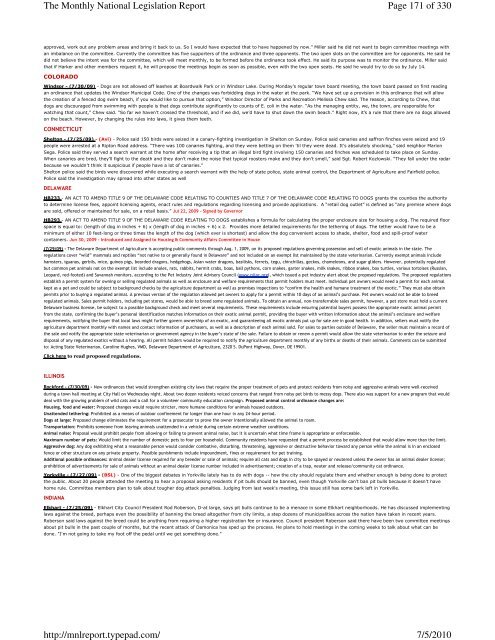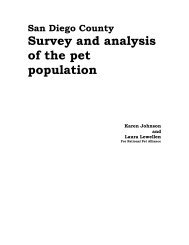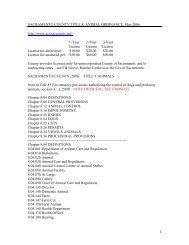Page 1 of 330 The Monthly National Legislation Report 7/5/2010 ...
Page 1 of 330 The Monthly National Legislation Report 7/5/2010 ...
Page 1 of 330 The Monthly National Legislation Report 7/5/2010 ...
You also want an ePaper? Increase the reach of your titles
YUMPU automatically turns print PDFs into web optimized ePapers that Google loves.
<strong>The</strong> <strong>Monthly</strong> <strong>National</strong> <strong>Legislation</strong> <strong>Report</strong>http://mnlreport.typepad.com/<strong>Page</strong> 171 <strong>of</strong> <strong>330</strong>7/5/<strong>2010</strong>approved, work out any problem areas and bring it back to us. So I would have expected that to have happened by now." Miller said he did not want to begin committee meetings withan imbalance on the committee. Currently the committee has five supporters <strong>of</strong> the ordinance and three opponents. <strong>The</strong> two open slots on the committee are for opponents. He said hedid not believe the intent was for the committee, which will meet monthly, to be formed before the ordinance took effect. He said its purpose was to monitor the ordinance. Miller saidthat if Harker and other members request it, he will propose the meetings begin as soon as possible, even with the two open seats. He said he would try to do so by July 14.COLORADOWindsor - (7/30/09) - Dogs are not allowed <strong>of</strong>f leashes at Boardwalk Park or in Windsor Lake. During Monday’s regular town board meeting, the town board passed on first readingan ordinance that updates the Windsor Municipal Code. One <strong>of</strong> the changes was forbidding dogs in the water at the park. “We have set up a provision in this ordinance that will allowthe creation <strong>of</strong> a fenced dog swim beach, if you would like to pursue that option,” Windsor Director <strong>of</strong> Parks and Recreation Melissa Chew said. <strong>The</strong> reason, according to Chew, thatdogs are discouraged from swimming with people is that dogs contribute significantly to counts <strong>of</strong> E. coli in the water. “As the managing entity, we, the town, are responsible forwatching that count,” Chew said. “So far we haven’t crossed the threshold, and if we did, we’d have to shut down the swim beach.” Right now, it’s a rule that there are no dogs allowedon the beach. However, by changing the rules into laws, it gives them teeth.CONNECTICUTShelton - (7/25/09) - (Avi) - Police said 150 birds were seized in a canary-fighting investigation in Shelton on Sunday. Police said canaries and saffron finches were seized and 19people were arrested at a Ripton Road address. “<strong>The</strong>re was 100 canaries fighting, and they were betting on them 'til they were dead. It’s absolutely shocking,” said neighbor MarionSega. Police said they served a search warrant at the home after receiving a tip that an illegal bird fight involving 150 canaries and finches was scheduled to take place on Sunday.When canaries are bred, they’ll fight to the death and they don’t make the noise that typical roosters make and they don’t smell,” said Sgt. Robert Kozlowski. “<strong>The</strong>y fall under the radarbecause we wouldn’t think it suspicious if people have a lot <strong>of</strong> canaries.”Shelton police said the birds were discovered while executing a search warrant with the help <strong>of</strong> state police, state animal control, the Department <strong>of</strong> Agriculture and Fairfield police.Police said the investigation may spread into other states as wellDELAWAREHB233 - AN ACT TO AMEND TITLE 9 OF THE DELAWARE CODE RELATING TO COUNTIES AND TITLE 7 OF THE DELAWARE CODE RELATING TO DOGS grants the counties the authorityto determine license fees, appoint licensing agents, enact rules and regulations regarding licensing and provide applications. A “retail dog outlet” is defined as “any premise where dogsare sold, <strong>of</strong>fered or maintained for sale, on a retail basis.” Jul 22, 2009 - Signed by GovernorHB293 - AN ACT TO AMEND TITLE 9 OF THE DELAWARE CODE RELATING TO DOGS establishes a formula for calculating the proper enclosure size for housing a dog. <strong>The</strong> required floorspace is equal to: (length <strong>of</strong> dog in inches + 6) x (length <strong>of</strong> dog in inches + 6) x 2. Provides more detailed requirements for the tethering <strong>of</strong> dogs. <strong>The</strong> tether would have to be aminimum <strong>of</strong> either 10 feet-long or three times the length <strong>of</strong> the dog (which ever is shortest) and allow the dog convenient access to shade, shelter, food and spill-pro<strong>of</strong> watercontainers. Jun 30, 2009 - Introduced and Assigned to Housing & Community Affairs Committee in House(7/29/09) - <strong>The</strong> Delaware Department <strong>of</strong> Agriculture is accepting public comments through Aug. 1, 2009, on its proposed regulations governing possession and sell <strong>of</strong> exotic animals in the state. <strong>The</strong>regulations cover “wild” mammals and reptiles “not native to or generally found in Delaware” and not included on an exempt list maintained by the state veterinarian. Currently exempt animals includehamsters, iguanas, gerbils, mice, guinea pigs, bearded dragons, hedgehogs, Asian water dragons, basilisks, ferrets, tegu, chinchillas, geckos, chameleons, and sugar gliders. However, potentially regulatedbut common pet animals not on the exempt list include anoles, rats, rabbits, hermit crabs, boas, ball pythons, corn snakes, garter snakes, milk snakes, ribbon snakes, box turtles, various tortoises (Russian,Leopard, red-footed) and Savannah monitors, according to the Pet Industry Joint Advisory Council (www.pijac.org), which issued a pet industry alert about the proposed regulations. <strong>The</strong> proposed regulationsestablish a permit system for owning or selling regulated animals as well as enclosure and welfare requirements that permit holders must meet. Individual pet owners would need a permit for each animalkept as a pet and could be subject to background checks by the agriculture department as well as premises inspections to “confirm the health and humane treatment <strong>of</strong> the exotic.” <strong>The</strong>y must also obtainpermits prior to buying a regulated animal. A previous version <strong>of</strong> the regulation allowed pet owners to apply for a permit within 10 days <strong>of</strong> an animal’s purchase. Pet owners would not be able to breedregulated animals. Sales permit holders, including pet stores, would be able to breed some regulated animals. To obtain an annual, non-transferrable sales permit, however, a pet store must hold a currentDelaware business license, be subject to a possible background check and meet several requirements. <strong>The</strong>se requirements include ensuring potential buyers possess the appropriate exotic animal permitfrom the state, confirming the buyer’s personal identification matches information on their exotic animal permit, providing the buyer with written information about the animal’s enclosure and welfarerequirements, notifying the buyer that local laws might further govern ownership <strong>of</strong> an exotic, and guaranteeing all exotic animals put up for sale are in good health. In addition, sellers must notify theagriculture department monthly with names and contact information <strong>of</strong> purchasers, as well as a description <strong>of</strong> each animal sold. For sales to parties outside <strong>of</strong> Delaware, the seller must maintain a record <strong>of</strong>the sale and notify the appropriate state veterinarian or government agency in the buyer’s state <strong>of</strong> the sale. Failure to obtain or renew a permit would allow the state veterinarian to order the seizure anddisposal <strong>of</strong> any regulated exotics without a hearing. All permit holders would be required to notify the agriculture department monthly <strong>of</strong> any births or deaths <strong>of</strong> their animals. Comments can be submittedto: Acting State Veterinarian, Caroline Hughes, VMD, Delaware Department <strong>of</strong> Agriculture, 2320 S. DuPont Highway, Dover, DE 19901.Click here to read proposed regulations.ILLINOISRockford - (7/30/09) - New ordinances that would strengthen existing city laws that require the proper treatment <strong>of</strong> pets and protect residents from noisy and aggressive animals were well-receivedduring a town hall meeting at City Hall on Wednesday night. About two dozen residents voiced concerns that ranged from noisy pet birds to messy dogs. <strong>The</strong>re also was support for a new program that woulddeal with the growing problem <strong>of</strong> wild cats and a call for a volunteer community education campaign. Proposed animal control ordinance changes are:Housing, food and water: Proposed changes would require stricter, more humane conditions for animals housed outdoors.Unattended tethering: Prohibited as a means <strong>of</strong> outdoor confinement for longer than one hour in any 24-hour period.Dogs at large: Proposed change eliminates the requirement for a prosecutor to prove the owner intentionally allowed the animal to roam.Transportation: Prohibits someone from leaving animals unattended in a vehicle during certain extreme weather conditions.Animal noise: Proposal would prohibit people from allowing or failing to prevent animal noise, but it is uncertain what time frame is appropriate or enforceable.Maximum number <strong>of</strong> pets: Would limit the number <strong>of</strong> domestic pets to four per household. Community residents have requested that a permit process be established that would allow more than the limit.Aggressive dog: Any dog exhibiting what a reasonable person would consider combative, disturbing, threatening, aggressive or destructive behavior toward any person while the animal is in an enclosedfence or other structure on any private property. Possible punishments include impoundment, fines or requirement for pet training.Additional possible ordinances: Animal dealer license required for any breeder or sale <strong>of</strong> animals; require all cats and dogs in city to be spayed or neutered unless the owner has an animal dealer license;prohibition <strong>of</strong> advertisements for sale <strong>of</strong> animals without an animal dealer license number included in advertisement; creation <strong>of</strong> a trap, neuter and release/community cat ordinance.Yorkville - (7/27/09) - (BSL) - One <strong>of</strong> the biggest debates in Yorkville lately has to do with dogs -- how the city should regulate them and whether enough is being done to protectthe public. About 20 people attended the meeting to hear a proposal asking residents if pit bulls should be banned, even though Yorkville can't ban pit bulls because it doesn't havehome rule. Committee members plan to talk about tougher dog attack penalties. Judging from last week's meeting, this issue still has some bark left in Yorkville.INDIANAElkhart - (7/25/09) - Elkhart City Council President Rod Roberson, D-at large, says pit bulls continue to be a menace in some Elkhart neighborhoods. He has discussed implementinglaws against the breed, perhaps even the possibility <strong>of</strong> banning the breed altogether from city limits, a step dozens <strong>of</strong> municipalities across the nation have taken in recent years.Roberson said laws against the breed could be anything from requiring a higher registration fee or insurance. Council president Roberson said there have been two committee meetingsabout pit bulls in the past couple <strong>of</strong> months, but the recent attack <strong>of</strong> Damonica has sped up the process. He plans to hold meetings in the coming weeks to talk about what can bedone. "I'm not going to take my foot <strong>of</strong>f the pedal until we get something done."




